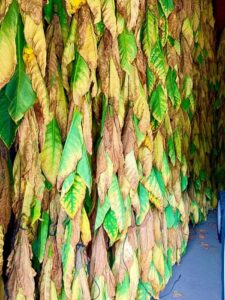
Andorran tobacco leaves (© Guia Andorra, https://en.guiandorra.com/post/the-manufacture-of-tobacco-a-production-full-of-tradition-and-of-great-economic-weight).
It should not be that strange that in a world where everything can be sold (well, almost) even States might think to capitalize on their own names and thus seek protection of the same as a trademark. However, getting one registered seems increasingly difficult and as confirmed by the recent decision issued last February 23rd case T‑806/19.
The Government of Andorra filed an EUTM application for the following sign

designating a wide range of goods and services, namely “Photographs” (class 16), “Tobacco” (class 34), “Financial affairs; monetary affairs; real estate affairs” (class 36), “Travel arrangements” (Class 39), “Education; training; entertainment; sports and cultural activities; micro-publishing; publishing of books; publishing of texts other than advertising texts; electronic publishing of books and online periodicals; provision of non-downloadable online electronic publications” (Class 41) and “Beauty care” (class 44). The EUIPO refused it and the BOA confirmed the refusal for being a mark that consists of the mere indication of the geographical origin of the designated goods and services.
The applicant filed an appeal before the GC, arguing, among others, that the State of Andorra was not known for the products and services concerned, and that consumers could therefore not associate the mark applied for with an indication of their geographical origin.
The GC rejected the appeal, confirming the descriptive character of the mark ANDORRA. As to “Photographs” and “Travel arrangements”, the GC reasoned that the mark applied for may constitute a direct reference to the place where the photographs are taken and, in view of the eminently touristic nature of Andorra, as an indication that the travel services it designates originate in that region. As far as services in classes 41 and 44 were concerned, the refusal was justified because Andorra is known for a specific educational system and for specific beauty treatments.
Interestingly, in relation to tobacco products, the GC held that since it is a well-known fact that tobacco is sold in the state of Andorra under advantageous economic conditions, there is an association with the Andorra State and tobacco products. This association is capable to make consumers perceive the mark as an indication of the geographical origin of the goods. For those who have been to Andorra and are aware of the rich tobacco-growing history of it (in fact, before tourism, tobacco production was the country’s main economic pillar, see here), the lack of any mention thereof in this context is likely surprising – although this would of course only have led to the same result.
For services in class 36, the GC made similar considerations as for tobacco products, stating that the trademark applied for could refer to a characteristic of the services in question, namely that they are subject to an advantageous tax regime such as that existing in the state of Andorra. This reminds of Case T-11/15 (SUEDTIROL, cf. § 42).
The case shows how difficult it can be to obtain registration of geographical names, especially for places offering of a wide range of economic activities under specific marketing conditions, which is precisely the case of States. It really needs to be said once again that, when it comes to trademarks corresponding to geographical indications, the GC does not make concessions to anyone.
_____________________________
To make sure you do not miss out on regular updates from the Kluwer Trademark Blog, please subscribe here.


